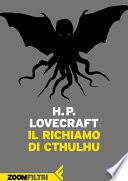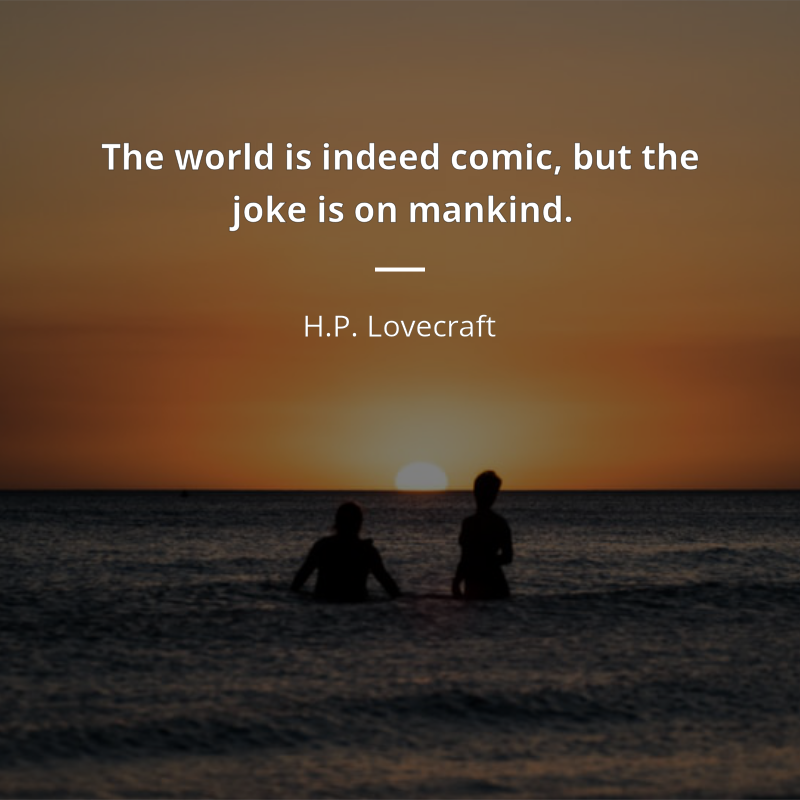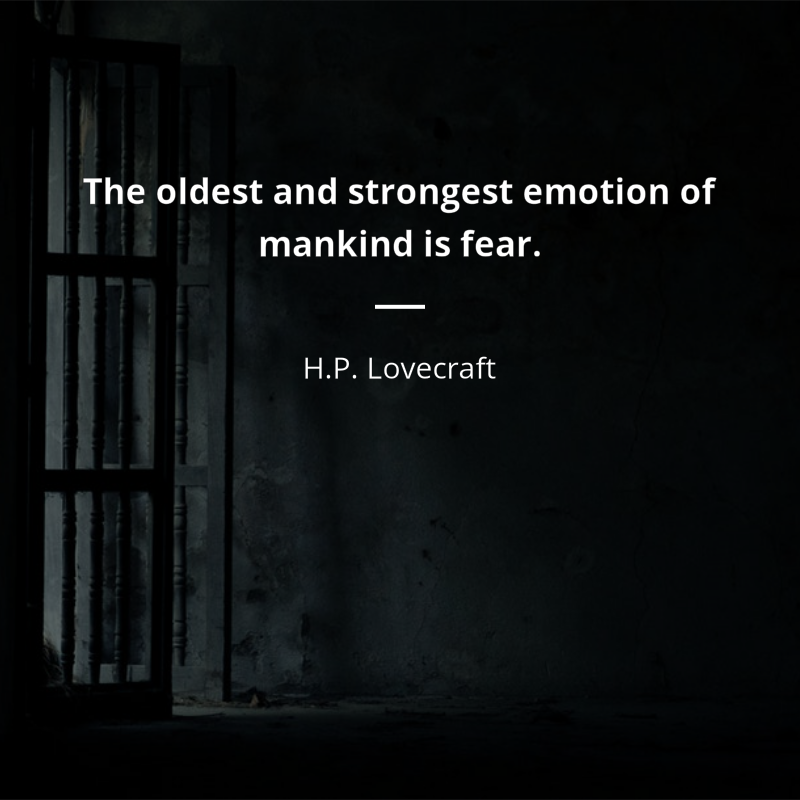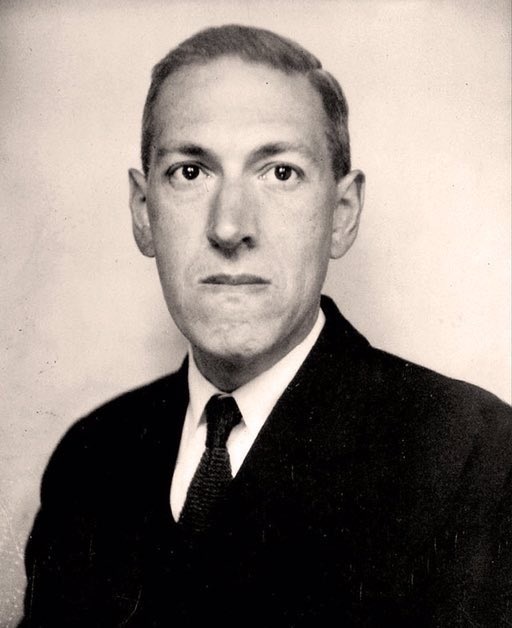da Supernatural Horror in Literature, 1927
Lavori

Il richiamo di Cthulhu
Howard Phillips LovecraftHoward Phillips Lovecraft frasi celebri
Frasi sulla vita di Howard Phillips Lovecraft
da Ex Oblivion, 1921
Tutti i racconti 1897-1922
Frasi sul mondo di Howard Phillips Lovecraft
The Call of Cthulhu
da Qualcosa dall'alto, 1929
da L'oceano della notte, 1936
da La tomba, 1917
Howard Phillips Lovecraft Frasi e Citazioni
“Non è morto ciò che può vivere in eterno, | E in strani eoni anche la morte può morire.”
da La Città senza Nome, 1921
Variante: Non è morto ciò che può vivere in eterno,
E in strani eoni anche la morte può morire.
Le storie del ciclo di Cthulhu: Il mito. Tomo 1
citato in Montague Rhodes James, Fantasmi e altri orrori a cura di Gianni Pilo e Sebastiano Fusco, TEN, 1993
Tutte le storie dell'orrore puro. L'incubo. Tomo I
da Hypnos, 1922
da Lettere dall'altrove
da I gatti di Ulthar, 1920
explicit di Finché tutti i mari..., 1935
da Da altrove, 1920
Howard Phillips Lovecraft: Frasi in inglese
“That is not dead which can eternal lie,
And with strange aeons even death may die.”
Variante: That is not dead which can eternal lie,
And with strange aeons even death may die.
Origine: The Nameless City


Variante: We live on a placid island of ignorance in the midst of black seas of the infinity, and it was not meant that we should voyage far.
Origine: The Call of Cthulhu
“For I have always been a seeker, a dreamer, and a ponderer on seeking and dreaming…”
Origine: Night Ocean et autres nouvelles

“Memories and possibilities are ever more hideous than realities.”
"Herbert West: Re-Animator" in "Home Brew" Vol. 1, No. 1 (February 1922)
Fiction
"Supernatural Horror in Literature" (1927)
Non-Fiction
Variante: The oldest and strongest emotion of mankind is fear, and the oldest and strongest kind of fear is fear of the unknown
Origine: The Complete Fiction of H.P. Lovecraft
Letter to Catherine L. Moore (7 February 1937), in Selected Letters V, 1934-1937 edited by August Derleth and Donald Wandrei, pp. 407-408
Non-Fiction, Letters
"Nietzscheism and Realism" from The Rainbow, Vol. I, No. 1 (October 1921); reprinted in "To Quebec and the Stars", and also in Collected Essays, Volume 5: Philosophy edited by S. T. Joshi, p. 71
Non-Fiction
Origine: Collected Essays 5: Philosophy, Autobiography and Miscellany
“Ultimate horror often paralyses memory in a merciful way.”
Origine: The Rats in the Walls
Origine: The Annotated Supernatural Horror in Literature: Revised and Enlarged
“From even the greatest of horrors irony is seldom absent.”
Fiction, The Shunned House (1924)
Origine: Tales of H.P. Lovecraft
Fiction, The Call of Cthulhu (1926)
Contesto: There had been aeons when other Things ruled on the earth, and They had had great cities. Remains of Them, he said the deathless Chinamen had told him, were still be found as Cyclopean stones on islands in the Pacific. They all died vast epochs of time before men came, but there were arts which could revive Them when the stars had come round again to the right positions in the cycle of eternity. They had, indeed, come themselves from the stars, and brought Their images with Them.
These Great Old Ones, Castro continued, were not composed altogether of flesh and blood. They had shape — for did not this star-fashioned image prove it? — but that shape was not made of matter. When the stars were right, They could plunge from world to world through the sky; but when the stars were wrong, They could not live. But although They no longer lived, They would never really die...
“Without interest there can be no art.”
"The Defence Remains Open!" (April 1921), published in Collected Essays, Volume 5: Philosophy edited by S. T. Joshi, p. 53
Non-Fiction
Contesto: The opinions of the masses are of no interest to me, for praise can truly gratify only when it comes from a mind sharing the author's perspective. There are probably seven persons, in all, who really like my work; and they are enough. I should write even if I were the only patient reader, for my aim is merely self-expression. I could not write about "ordinary people" because I am not in the least interested in them. Without interest there can be no art. Man's relations to man do not captivate my fancy. It is man's relation to the cosmos—to the unknown—which alone arouses in me the spark of creative imagination. The humanocentric pose is impossible to me, for I cannot acquire the primitive myopia which magnifies the earth and ignores the background. Pleasure to me is wonder—the unexplored, the unexpected, the thing that is hidden and the changeless thing that lurks behind superficial mutability. To trace the remote in the immediate; the eternal in the ephemeral; the past in the present; the infinite in the finite; these are to me the springs of delight and beauty. Like the late Mr. Wilde, "I live in terror of not being misunderstood."
“I know always that I am an outsider; a stranger in this century and among those who are still men.”
Origine: The Outsider
“In his house at R'lyeh, dead Cthulu waits dreaming”
Origine: The Call of Cthulhu and Other Weird Stories

